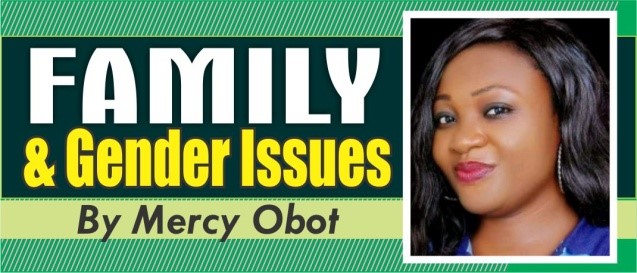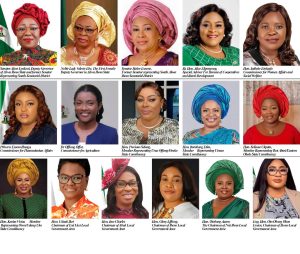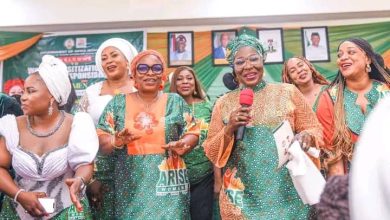
In the past 26 years of democracy in Nigeria, particularly in Akwa Ibom State, women’s participation in politics has experienced gradual progress, but the affirmative action of 35 per cent is yet to be actualized.
Since the state transitioned to democracy in 1999, women have continued to face complex challenges due to the entrenched patriarchal system embedded in the nation’s social norms.
Despite the contemporary era, some ideologies still believe women should maintain a culture of silence when political issues are raised.

Apart from this, other barriers, including pervasive cultural and religious influences, stand as major roadblocks that contribute to women’s underrepresentation in Akwa Ibom State’s politics.
As witnessed during these democratic years, few leadership positions are allocated to women, and when political challenges become overwhelming, women are often not offered seats in the political arena.
For instance, Akwa Ibom State is yet to elect a woman to the positions of governor, and speaker of the State House of Assembly. In Uyo and Ikot Ekpene Senatorial Districts, no woman has been a senator since 1999.
Related: A’Ibom Women Advocate For Establishment Of Special Courts To Handle GBV Cases
To delve deeper into the issue, Crystal Express Newspaper investigated the representation of women in the Akwa Ibom State legislature, tracing female lawmakers from the 1st to the 8th Assembly.
Setting a precedent for future generations, Akwa Ibom State’s first legislature between 1992 and 1993, had only one female member among 48 representatives.
Notably, Obonganwan Grace Edim-Inyang, representing the Itu/Oma/Itam (now Itu) State Constituency, was elected the first deputy speaker.
However, in the democratic era – the 2nd Assembly (1999-2003) was created and there was no female representative in the Chamber.
The 3rd Assembly (2003-2007), had two elected female House members, Hon. Iniobong Eshiet (Etinan) and Hon. Mabel Udongwo (Oruk Anam). Following her husband’s demise, who was a member of the State Assembly, Hon. Sarah Esitikott (Nsit Ibom) won a bye-election to fill the vacant seat.
The trend of minimal female representatives continued, with the 4th Assembly (2007 – 2011) having two female lawmakers – Dr Ekaette Okon (Itu) and Hon. Alice Ekpenyong (Mbo).
In the 5th Assembly (2011-2015), there were also two female lawmakers – Hon. Sarah Elijah (Nsit Atai) and Alice Ekpenyong (Mbo).
Meanwhile, the 6th Assembly (2015-2019) had two female assembly members as the Hon. Felicia Bassey (Okobo) emerged as the second deputy Speaker while Hon. Mfon Ekong represented the Nsit Ibom State Constituency.
The 7th Assembly (2019- 2023) had two female lawmakers, the second female deputy speaker – Hon. Felicia Bassey (Okobo) and Hon. Charity Ido (Ukanafun).
Interestingly, the present 8th Assembly has a slight increase in representation, with four female lawmakers – Hon. Kenim Victor (Oron/Udung Uko), Hon. Selina Ukpatu (Ikot Abasi/Eastern Obolo), Hon. Itorobong Etim (Uruan) and Hon. Precious Selong (Urue Offong/Oruko).
From the above analysis in the State House of Assembly, female lawmakers have rarely exceeded four, indicating the extent of segregation when it comes to women emerging as winners in electoral polls.
Even in the Red Chamber, only three women have served as senators in Akwa Ibom State and they all represented Eket Senatorial District – Senator Eme Uffot Ekaette, Senator Helen Esuene and Senator Akon Eyakenyi.
Aside from legislature, the State Executive Council has only two deputy governors – Noble Lady Valerie Ebe (first female deputy governor) and the current deputy governor, Senator Akon Eyakenyi.
In the present State Executive Council, there are only four females, out of 27 members: Dr Offiong Offor, agriculture commissioner; Princess Emem Ibanga, commissioner for humanitarian affairs; Hon. Inibehe Etukudo, commissioner for women affairs and social welfare and Rt. Hon. Alice Ekpenyong, special adviser for the Bureau of Cooperatives and Rural Development.
Impressively, in the current local government tier, five women were voted in as council bosses, while 26 females were elected as vice chairmen. The five female chairmen include – Hon. Otobong Essien (Ikono), Hon. Otobong Aaron (Nsit Ibom), Hon. Glory Effiong (Ibeno), Hon. Ime Charles (Abak) and Hon. Uduak Ikot (Esit Eket).
Despite these problems that impede women’s progress in politics, there are notable changes heightening women’s political consciousness to participate effectively in the electoral process. Arguably, the Umo Eno-led administration is the most generous in terms of women’s inclusion.
In the area of political development, women continue to play a crucial role in grassroots mobilization and campaigning for candidates from diverse parties.
Beyond this, women have navigated the country’s precarious economy to occupy sensitive positions in the state as seen in the current administration.
Certainly, a time will come when women’s participation in Akwa Ibom State politics will not only grant women the right to exercise their franchise but also give them more opportunities to be candidates and receive enough appointments at all levels of government within a party structure.
It is imperative to note that women are regarded as the bedrock of a nation’s social, economic and political development, and with these extensive roles, there is a dire need for more women’s participation to be encouraged and promoted in the development of the state’s affairs.
To foster greater representation, implementing policies that promote women’s empowerment and providing leadership training and resources can help bridge the gap. This includes capacity-building programmes, mentorship initiatives, and awareness campaigns to challenge patriarchal norms and promote women’s participation in politics.
Although women have contributed immensely to political development, Akwa Ibom State’s democracy remains a male-dominated affair, with women facing ongoing challenges in securing meaningful representation in politics.
However, with sustained efforts and commitment, there is hope for more women’s inclusion and an equitable political landscape in Akwa Ibom State.




